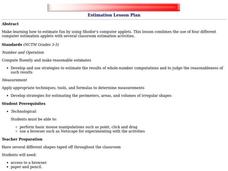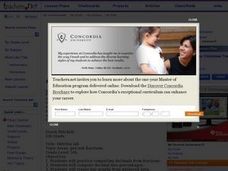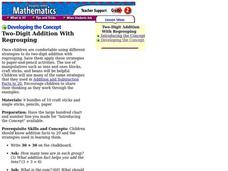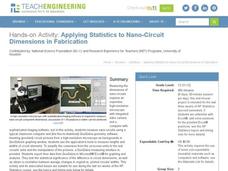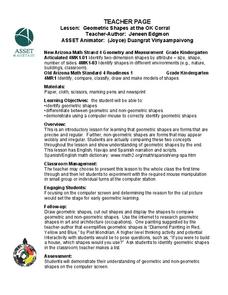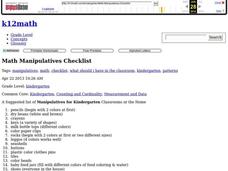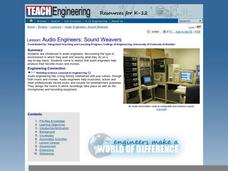Curated OER
Misleading Graphs
Students explore number relationships by participating in a data collection activity. In this statistics instructional activity, students participate in a role-play activitiy in which they own a scrap material storefront that must...
Curated OER
Perimeter
Students use their hands, feet, computer, and rulers to measure the perimeter of objects. In this measurement lesson plan, students measure objects around the room and computer generated shapes.
Curated OER
Fraction Conversions
Students convert between fractions, decimals, and percents using money. In this conversions lesson plan, students play with a mock store in class.
Curated OER
Estimation
Students complete computer activities about estimating if items are more or less than a given amount. For this estimation lesson plan, students also estimate measurements around the classroom.
Curated OER
Venn Diagram
Young scholars classify items and numbers by using a Venn diagram. In this Venn diagram lesson plan, students use the computer to do this and classify pictures and numbers.
Curated OER
Fraction and Decimal Garden
Third graders write fractions and decimals using unifix cube models and grid paper. They draw a garden using grid paper and label each section with the correct fraction and decimal to the tenths. This is a clever way to use manipulatives...
Curated OER
Skittles Lab
Students use Skittles as manipulatives to practice computing decimals from fractions, computing decimals into percentages, and creating bar graphs from gathered data.
Curated OER
Recognizing Patterns
Young scholars explore the concept of patterns. In this patterns instructional activity, students use applets to manipulate tessellations. Young scholars predict the next number in a sequence by recognizing patterns.
Curated OER
Two-Digit Addition With Regrouping
Second graders practice two-digit addition with regrouping. In this addition lesson, 2nd graders use craft sticks to solve two-digit regrouping problems. Students solve problems on the chalkboard.
Curated OER
Adding and Subtracting Fractions
Third graders practice adding and subtracting fractions. In this addition lesson, 3rd graders use paper fraction kits made from colored construction paper and complete several fraction problems on the chalkboard.
Curated OER
School Store
Fourth graders complete a worksheet where they calculate costs of items in a school store by using multiplication. In this multiplication lesson plan, 4th graders find the total cost of all the supplies and the cost per item.
Curated OER
Probability: Playing With Fire
Students problem solve to find the probability of each tree in a small forest to catch fire. In this probability lesson plan, students use the computer to complete this application.
Curated OER
Playing With Probability
Students rotate through work stations where they compute problems of theoretical and experimental probability. In this probability lesson plan, students use simulations of a lottery system.
Curated OER
How Fast is it Traveling?
Learners calculate the rate of speed of various moving objects within the classroom setting, or outside under a controlled environment.
Curated OER
Graphs and Functions
Middle schoolers describe plotting functions on the Cartesian coordinate plane. They solve functions on paper and using an online tool to plot points on a Cartesian coordinate plane creating lines and parabolas.
Curated OER
Conditional Probability and Probability of Simultaneous Events
Your statisticians examine the characteristics of conditional probability and the probability of simultaneous independent events. They perform computer activities to find probabilities for simple compound events. They examine the...
Curated OER
Integers - Objects Model
Sixth and seventh graders solve 19 various types of problems related to integers as objects models. They write an integer that corresponds to each letter on a number line and then, arrange the integers from least to greatest. Pupils also...
University of Georgia
Using Freezing-Point Depression to Find Molecular Weight
Explore the mathematical relationship between a solvent and solute. Learners use technology to measure the cooling patterns of a solvent with varying concentrations of solute. Through an analysis of the data, pupils realize that the rate...
Virginia Department of Education
Nonlinear Systems of Equations
Explore nonlinear systems through graphs and algebra. High schoolers begin by examining the different types of quadratic functions and their possible intersections. They then use algebraic methods to solve systems containing various...
Teach Engineering
Applying Statistics to Nano-Circuit Dimensions in Fabrication
Do flexible circuits change dimensions during fabrication? Groups use GeoGebra software to measure the length of pictures of flexible nano-circuits. To determine if the circuits change dimensions, future engineers use Microsoft Excel to...
National Nanotechnology Infrastructure Network
Is Measuring an Art or a Science?
Not only do future engineers learn the difference between accuracy and precision, they also get some hands-on experience using different measuring tools.
Curated OER
Geometric Shapes at the OK Corral
Students explore geometric shapes. In this math activity, students identify geometric and non-geometric shapes using the computer. Students research geometric shapes in art and architecture.
Curated OER
Patterns
Explore early algebra by participating in a pattern identification activity using a random assortment of different household materials. The class creates, completes, and analyzes different patterns with the help of leggos, buttons,...
Curated OER
Audio Engineers: Sound Weavers
Young scholars explore audio engineering. In this career education and "sound" science lesson, students define related vocabulary and make connections between the music they listen to and the job an audio engineer does after listening to...





